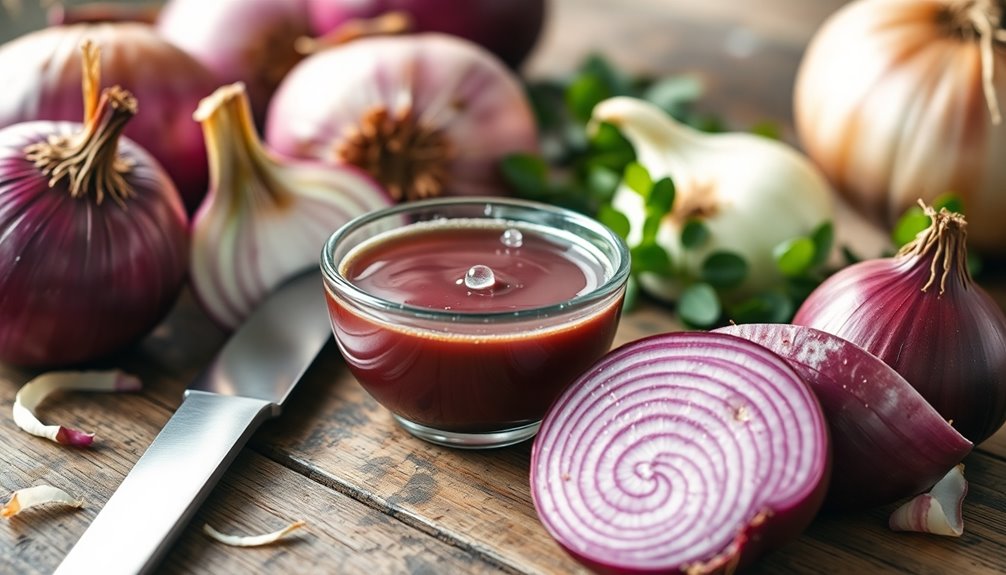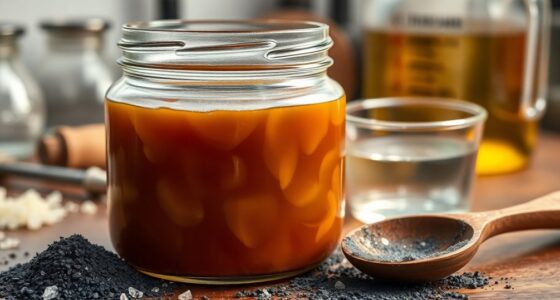To make onion juice without a blender or juicer, start by chilling a fresh onion in the fridge for 30 minutes. Then, grate the onion using a box grater to create shreds, being careful with your fingers. Place the grated onion in cheesecloth, twist it tightly, and squeeze over a bowl to extract the juice. Pour the juice into a sealed container and store it in the fridge or freeze it in ice cube trays. You'll find even more tips ahead!
Key Takeaways
- Chill a fresh onion in the refrigerator for 30 minutes to minimize eye irritation before grating.
- Use a box grater, focusing on the fine side, to grate the onion into shreds.
- Transfer the grated onion into cheesecloth, gather it into a pouch, and twist tightly.
- Squeeze the pouch over a bowl to collect the extracted onion juice efficiently.
- Store the juice in a sealed container in the refrigerator or freeze in ice cube trays for longer use.

Making onion juice at home is surprisingly simple, and you only need a few basic tools. If you're looking to make onion juice without a blender or juicer, you can easily do it with just a box grater and some cheesecloth. This method isn't only practical but also allows you to extract every drop of juice from the onion, which is perfect for various uses, from cooking to home remedies.
To get started, you'll want to grab a fresh onion and a box grater. It's a good idea to prep your onion by chilling it in the refrigerator for about 30 minutes. Chilling the onion helps reduce eye irritation, making the grating process a lot more manageable.
Once you've chilled the onion, take it out and set up your workspace with the grater and a bowl to catch the juice.
Now, let's dive into the grating process. Focus on the fine side of the box grater when grating the onion. This will maximize juice extraction, ensuring you get as much liquid as possible. As you grate, be mindful of the pungent aroma that may start to fill your kitchen. It's part of the onion's charm, but you might want to have some ventilation going to keep your eyes from watering too much.
After you've grated the onion, you'll have a pile of onion shreds. Next, you need to transfer these shreds into cheesecloth or a clean cloth. Gather the corners of the cloth to create a pouch that holds all the grated onion. This is where the magic happens!
You'll want to twist the pouch tightly to prepare for squeezing. Position the pouch over your bowl and begin to squeeze. Apply consistent pressure as you squeeze the pouch; this will help extract every last bit of onion juice while leaving the pulp behind.
Once you've finished squeezing, you should have a bowl filled with fresh onion juice. Now, you'll need to think about storage. To store onion juice properly, pour it into a tightly sealed container. If you plan on using the juice within a week, you can keep it in the refrigerator. Just remember to label the container with the date.
If you want to store it for a longer period, consider pouring the juice into ice cube trays and freezing it. This way, you can pop out a cube whenever you need some onion juice for your recipes or remedies.
Frequently Asked Questions
How to Blend an Onion Without a Blender?
To blend an onion without a blender, start by grabbing a box grater.
Use the fine side and rub the onion against it in a downward motion. Place a shallow bowl underneath to catch the juice as you grate.
Once you've grated the onion, transfer the shreds to a clean cloth, gather the corners, and twist to squeeze out the juice.
This method ensures you get the most flavor without any special equipment!
How Do You Extract the Juice From an Onion?
To extract juice from an onion, start by peeling and grating it using a fine grater.
Once you've got the shreds, place them in a cheesecloth or clean cloth. Gather the corners and twist it into a pouch.
Squeeze the pouch firmly over a bowl to collect the juice, applying steady pressure.
After you've extracted the juice, discard the leftover pulp and store the juice in a sealed container in the fridge.
How Do You Make Juice Without a Juicer or Blender?
Making juice without a juicer or blender is like finding treasure in your kitchen.
You can start by hand-grating your chosen fruit or vegetable, letting those juices flow.
Next, place the shredded bits in a clean cloth and twist it tightly to squeeze out every drop.
Keep applying pressure until you've extracted all the juice.
It's a simple process, and you'll enjoy fresh, homemade juice without fancy gadgets!
How to Make Onion Juice With Water?
To make onion juice with water, you'll first need to grate a fresh onion.
Collect the shreds in a bowl, then add a small amount of water to help extract juice without losing too much flavor.
Mix the grated onion and water, then place the mixture in a cheesecloth.
Squeeze it over a bowl to extract the juice while filtering out the solids.
Store the juice in a sealed container in the fridge.
Conclusion
In your quest for quick and convenient onion juice, remember that simple solutions shine! With just a few straightforward steps, you can effortlessly extract the essence of onions without fancy gadgets. This method not only saves time but also showcases the subtle sweetness and sharpness of onions. So, savor the satisfaction of your homemade juice and sprinkle it into your dishes for a delightful dash of flavor. Enjoy your culinary creations with this flavorful, fragrant addition!
Cindy thoroughly researches juicing trends, techniques, and recipes to provide readers with practical advice and inspiration. Her writing style is accessible, engaging, and designed to make complex concepts easy to understand. Cindy’s dedication to promoting the advantages of juicing shines through her work, empowering readers to make positive changes in their lives through the simple act of juicing.

















